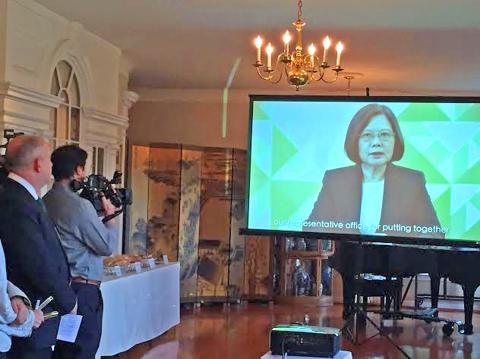President Tsai Ing-wen (蔡英文) has promised the US that Taiwan will be a “shining beacon” of freedom and democracy and a source of peace and stability in Asia and the world.
In a recorded video message to an inaugural celebration held at Taiwan’s Twin Oaks Estate in Washington, Tsai said Taiwan had once again shown that freedom, democracy and the rule of law were not just Western values, but were universal.
In the message, played shortly before Tsai’s inauguration, she told more than 100 guests, including members of the US Congress, officials from the American Institute in Taiwan (AIT) and the US-Taiwan community, that the US was Taiwan’s “most treasured friend.”

Photo: Nadia Tsao, Taipei Times
Tsai said the US-Taiwan relationship had grown and evolved and that the US had helped provide Taiwan with the security and confidence to meet the challenges before it.
She said the administration of US President Barack Obama and the US Congress had reaffirmed Taiwan as a “vital partner” and that Taiwan’s relationship with the US would be of the highest priority in her administration.
Tsai said that many challenges needed to be handled in a responsible manner and that she hoped to work hand-in-hand with the US to face the challenges together.
She said Taiwan would contribute in every way possible to the stability and prosperity of the region and that she wanted to thank the US “from the bottom of my heart” for its friendship.
Representative to the US Shen Lyu-shun (沈呂巡) said that Taiwan would do everything possible to ensure the continuation of its excellent relationship with the US.
He said the current relationship was the best that it had ever been and that Taiwan had been repeatedly cited by Washington officials as a “key component” of the US’ rebalance to Asia.
Shen said that on Capitol Hill, the US Senate’s Taiwan caucus has 35 members and the US House of Representatives’ Taiwan caucus has 211 members.
He said that there are 325,000 US jobs stemming from US economic relations with Taiwan.
Shen said he would be remiss if he did not acknowledge the long-term contribution that the policies of former president Ma Ying-jeou (馬英九) had made to the “remarkable improvement” in US-Taiwan relations.
He said he had no doubt that relations between Taiwan and the US would continue to grow under Tsai.
AIT Managing Director Joseph Donovan said that Taiwan’s democratic achievement provided a “great occasion for celebration.”
He said the US had a proud relationship with Taiwan and was proud of what it had accomplished with Ma and proud of what it believed it could accomplish in the years ahead.
“We congratulate President Tsai Ing-wen and look forward to working with her administration,” Donovan said.
US Representative Gerry Connolly said Taiwan was a remarkable model and that it provided hope for the people of Asia.
Director of the Democratic Progressive Party (DPP) mission in Washington Michael Fonte said Tsai fully intended to keep the partnership with the US alive and growing.
He said he was convinced that with US support on the economic and security fronts Taiwan would continue to be a pure and deep democratic partner and would work toward building security in the region.

Taiwanese can file complaints with the Tourism Administration to report travel agencies if their activities caused termination of a person’s citizenship, Mainland Affairs Council Minister Chiu Chui-cheng (邱垂正) said yesterday, after a podcaster highlighted a case in which a person’s citizenship was canceled for receiving a single-use Chinese passport to enter Russia. The council is aware of incidents in which people who signed up through Chinese travel agencies for tours of Russia were told they could obtain Russian visas and fast-track border clearance, Chiu told reporters on the sidelines of an event in Taipei. However, the travel agencies actually applied

Japanese footwear brand Onitsuka Tiger today issued a public apology and said it has suspended an employee amid allegations that the staff member discriminated against a Vietnamese customer at its Taipei 101 store. Posting on the social media platform Threads yesterday, a user said that an employee at the store said that “those shoes are very expensive” when her friend, who is a migrant worker from Vietnam, asked for assistance. The employee then ignored her until she asked again, to which she replied: "We don't have a size 37." The post had amassed nearly 26,000 likes and 916 comments as of this

New measures aimed at making Taiwan more attractive to foreign professionals came into effect this month, the National Development Council said yesterday. Among the changes, international students at Taiwanese universities would be able to work in Taiwan without a work permit in the two years after they graduate, explainer materials provided by the council said. In addition, foreign nationals who graduated from one of the world’s top 200 universities within the past five years can also apply for a two-year open work permit. Previously, those graduates would have needed to apply for a work permit using point-based criteria or have a Taiwanese company

The Shilin District Prosecutors’ Office yesterday indicted two Taiwanese and issued a wanted notice for Pete Liu (劉作虎), founder of Shenzhen-based smartphone manufacturer OnePlus Technology Co (萬普拉斯科技), for allegedly contravening the Act Governing Relations Between the People of the Taiwan Area and the Mainland Area (臺灣地區與大陸地區人民關係條例) by poaching 70 engineers in Taiwan. Liu allegedly traveled to Taiwan at the end of 2014 and met with a Taiwanese man surnamed Lin (林) to discuss establishing a mobile software research and development (R&D) team in Taiwan, prosecutors said. Without approval from the government, Lin, following Liu’s instructions, recruited more than 70 software